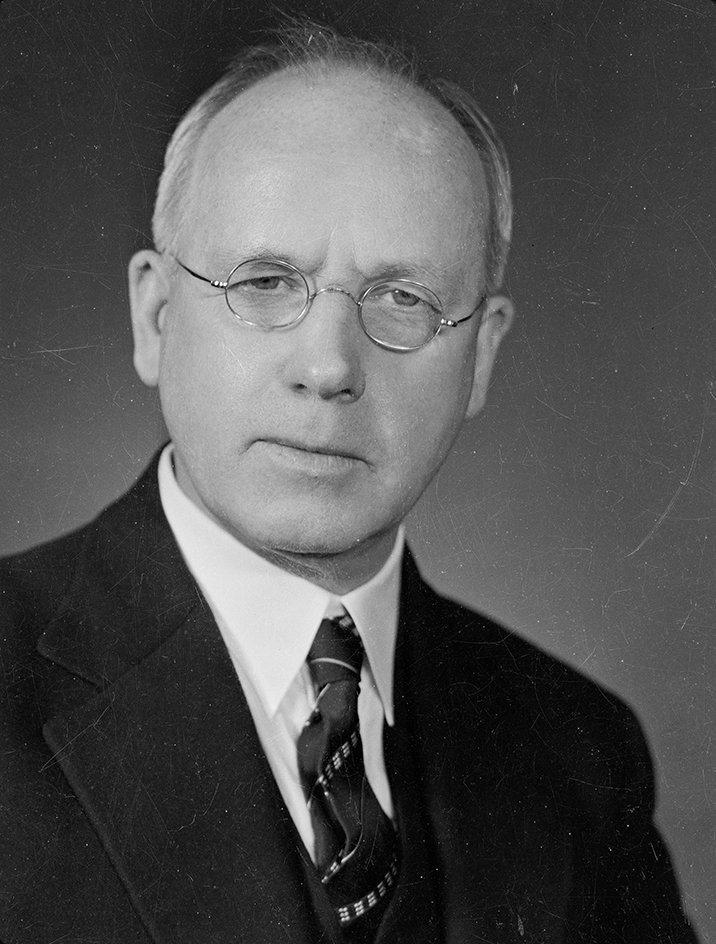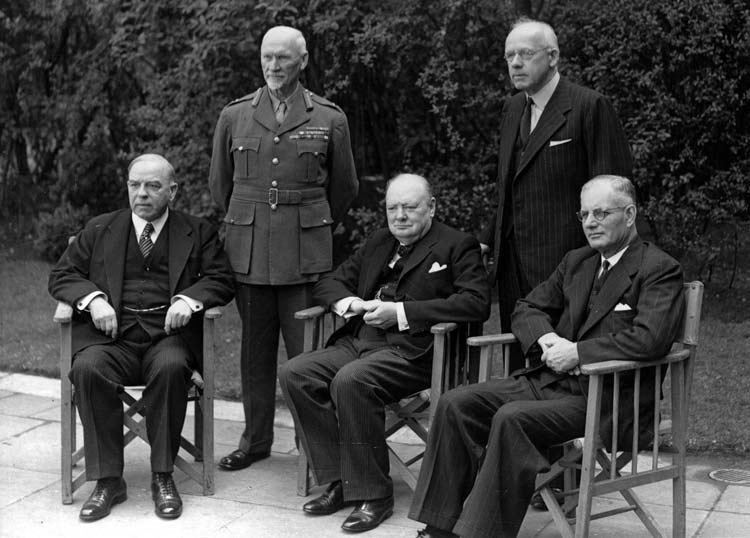Fraser, Peter (1884-1950), was prime minister of New Zealand from 1940 to 1949. He was a member of the Labour Party, a traditionally liberal political party. Fraser took office following the death of Prime Minister Michael Joseph Savage in 1940. Fraser headed New Zealand’s war effort during World War II (1939-1945). In addition, he supported the labor movement, worked to improve education and social services, and developed stronger relations between New Zealand and other nations.
Early life and family

Childhood.
Peter Fraser was born in Fearn, Scotland, on Aug. 28, 1884. His parents were Donald Fraser, a shoemaker, and Isabella McLeod Fraser. Peter left school at an early age and became an apprentice to a carpenter.
Donald Fraser belonged to a political group called the Liberal Association. Peter, as a teenager, served as the secretary to the association’s local branch. Peter suffered from poor eyesight, which ended his apprenticeship. In 1907, he moved to London. There, he joined the Independent Labour Party, a socialist political group.
Move to New Zealand.
Fraser had difficulty finding work in London, and in 1910 he decided to move to New Zealand. He arrived in Auckland, in New Zealand’s North Island, on Jan. 2, 1911.
Fraser found work on Auckland’s wharves and soon joined the New Zealand Socialist Party. He gained notice for his public speaking ability and leadership skills. In 1913, Fraser moved to Wellington, where he again worked on the wharves and was active in the labor movement.
In July 1916, Fraser played a leading role in a conference that led to the creation of the New Zealand Labour Party. Many Labour members opposed New Zealand’s participation in World War I (1914-1918). They also opposed conscription (military draft). In December 1916, Fraser and other Labour leaders were arrested for calling for the repeal of conscription. Fraser was charged with sedition (inciting rebellion) and sentenced to 12 months in prison.
Marriage.
On Nov. 1, 1919, Fraser married Janet Munro (1883-1945), a Scottish-born teacher who was also active in the Labour Party. The couple had no children together, though Janet had a son from a previous marriage.
Early parliamentary career
After finishing his jail term, Fraser reentered politics. In October 1918, he was elected to represent the electorate (voting district) of Wellington Central in New Zealand’s Parliament. He would continue to serve in Parliament for the rest of his life.
In 1919, Fraser was elected secretary of the Labour Party. Over the next decade, he became a highly influential member of the party, helping create policy and maintain agreement within the organization.
During the 1920’s, Fraser and many other Labour politicians softened some of their socialist positions. In his early years working on New Zealand’s docks, Fraser had opposed the arbitration system of settling disputes between employers and workers. Instead, he had preferred such direct actions as strikes and demonstrations. By the late 1920’s, however, he had come to favor more moderate actions to protect the rights of workers.
In 1933, Michael Savage became head of the Labour Party, and Fraser became his deputy. In 1935, Savage led Labour to victory in parliamentary elections and became the first Labour prime minister. Fraser was assigned several Cabinet portfolios (areas of official responsibility), including minister for education and minister for health. Fraser worked to improve New Zealand’s educational system and extended access to secondary education. He also helped pass a major social security bill and establish New Zealand’s largely free national health system.
Prime minister
Prime Minister Savage underwent surgery for cancer in August 1939, and Fraser became acting prime minister. Savage died on March 27, 1940, and the Labour Party elected Fraser as his official successor. Fraser became prime minister on April 1.

World War II
had begun on Sept. 1, 1939, when Germany invaded Poland. The United Kingdom entered the war against Germany on September 3, and New Zealand declared war on Germany later that same day. The war became the main focus of Fraser’s government, which introduced strict censorship rules as well as conscription. Though the Labour Party had traditionally opposed conscription, Fraser’s government felt it was necessary for the war effort.
New Zealand’s troops served primarily in Europe and North Africa. On Dec. 7, 1941, Japan attacked an American military base at Pearl Harbor, Hawaii. By early 1942, Japan had seized the British colony of Hong Kong, land in Southeast Asia, and a number of islands in the central and southern Pacific Ocean. These acts of aggression led some New Zealanders to believe that their country’s troops should be brought home to defend against a potential Japanese attack. Allied military advisers argued that the New Zealand forces should remain in Europe and North Africa. Fraser ultimately decided to keep the country’s armed forces where they were. He managed to persuade a sharply divided Parliament to support his decision.
In 1940, Fraser formed a small war cabinet made up of leaders from different political parties. The war cabinet handled matters specifically related to the war. A separate cabinet made up of Labour leaders handled other government functions. In 1942, the opposition leader, Sidney Holland of the National Party, joined the war cabinet. Holland also joined a larger group, called the war administration, that Fraser established at that time to deal with the growing amount of work connected to the war. Holland was a vocal critic of Fraser’s policies, and he withdrew the National members of Parliament from the war cabinet and the war administration after only a few months. Holland’s move caused disagreement within his own party. Several high-profile National members of Parliament left the party and rejoined the war cabinet as independents.
During the war, Fraser sought to strengthen relations between his country and the other Allied nations. He appointed his deputy, future Prime Minister Walter Nash, as minister to the United States. Fraser’s government also formed ties with the government of Australian Prime Minister John Joseph Curtin.
Founding of the United Nations (UN).
Fraser made significant contributions to the Charter of the United Nations, the document that established the UN. Representatives from 50 Allied nations met in San Francisco from April to June 1945 to draft the charter. Fraser was one of the representatives who signed the charter on June 26, 1945. It came into force later that year.
Fraser was chairman of the committee that wrote the section of the charter that established the UN’s Trusteeship Council. The council sought to help territories that at the time were not independent. Fraser also helped establish the role of the UN’s Economic and Social Council, which works to advance human rights and improve standards of living.
Māori affairs.
During the war, Fraser worked closely with leaders from New Zealand’s native Māori << MOW ree or MAH ree >> community. His government created the Māori War Effort Organisation (MWEO), which recruited Māori for both war service and domestic war-related work. The MWEO gave Māori hope that they would be given a greater amount of autonomy (self-rule) following the war.
Fraser helped pass the Māori Social and Economic Advancement Act 1945. The legislation promoted the well-being of Māori communities and culture, though it did not give Māori the degree of self-rule they sought. Much of the MWEO was merged into the government’s existing native affairs ministry.
In 1946, Fraser assigned himself the portfolio for native affairs. The following year, he changed the name of the ministry to Māori affairs.
Later years
Fraser’s government was reelected in 1943 and 1946. By 1946, however, Fraser had lost much of his support and only barely secured a victory. He faced criticism not only from the opposing National Party but also from within his own party.
Many Labour politicians thought Fraser was focusing his energies too much on international politics and not enough on the welfare of the nation. They also questioned his call for continued mandatory military service during peacetime. Fraser believed such service was necessary due to the rivalry that had developed between Communist and non-Communist nations after World War II.
Fraser’s support continued to dwindle. The National Party defeated Labour in the 1949 general election, and Sidney Holland became prime minister. Fraser’s health was failing, but he remained leader of the Labour Party. He held the position until his death in Wellington on Dec. 12, 1950.
